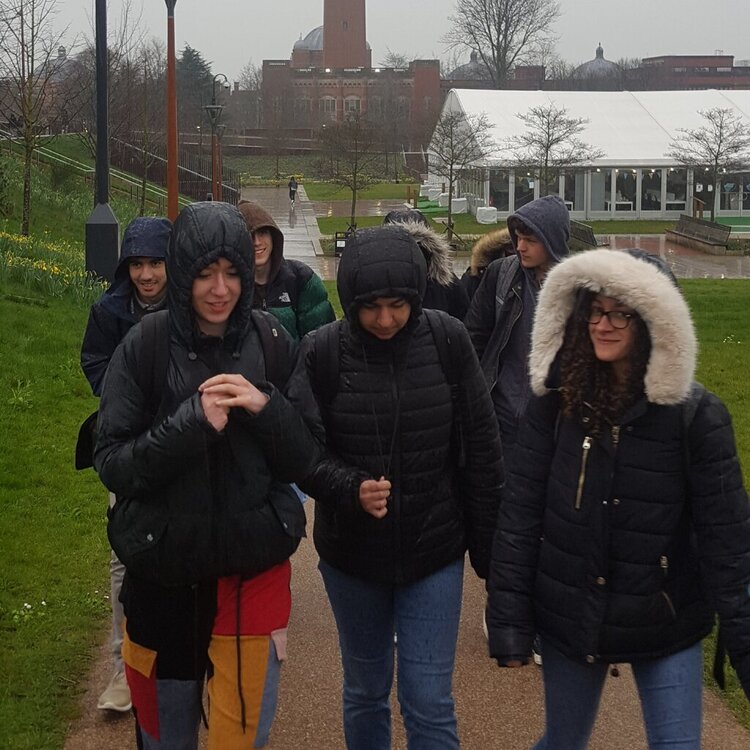Curriculum Information
Subject rationale – Why study the subject? What benefits does it bring?
There are many reasons why we chose to teach French at Bishop Challoner. First of all, we feel that it is our responsibility that our students are able to speak and understand a foreign language. Learning French enables them to communicate in the only other foreign language that is spoken across all five continents. In addition, we have put together a curriculum, which is designed to open horizons, help students better understand their own language, and discover a history and culture, which directly and indirectly constitute a part of their own heritage.
French is taught at Bishop Challoner by native speakers and experienced teachers, who draw on their first-hand experience of French culture to inspire students to go beyond the limits of their ‘comfort zone’. We want our students to be enriched by discovering a society, which although geographically and historically close, is culturally very different.
Furthermore, our curriculum importantly contributes to the school’s mission statement, that is to enable our learners to reach their full potential through the study of French. It is designed to equip our students with vital tools such as learning to learn, problem solving, the basic understanding of grammar, and the enrichment of their vocabulary in both their own language and in French. Moreover, with the regular use of the target language in classrooms, we want to model to our students how to become confident speakers, as well as to take pride in the work they produce, thus improving their employability.
Languages programme of study states that ‘Learning a foreign language is a liberation from insularity and provides an opening to other cultures’. It is our aim to not solely teach our students a foreign language, it is also to give them an opportunity to see the world through different eyes, whether they choose to carry on learning French at a higher level or not.
KS3 curriculum overview
The French KS3 curriculum enables pupils to develop language skills through a variety of contexts and gives pupils opportunities to explore aspects of the life and culture of countries and communities where the French is spoken. These include people, places, festivals, national events, food, sport, history, education, climate, geographical features, buildings, the spoken and the written word, music and song, the visual arts and the media. Schemes of work are developed with the aim of fostering excellent language skills through creativity and enjoyment.
What do our students study in KS3?
Year 7
Autumn - All about myself
Spring - Free time activities and hobbies
Summer 1 - Cultural topic: colours and francophone places around the world
Summer 2 - School
Year 8
Autumn - School
Spring - Me and my future
Summer 1 - Francophone world and food
Summer 2 - Holidays
Year 9
Autumn - Family and friends relationships
Spring - School and future plans
Summer 1 - Healthy lifestyle
Summer 2 - Where I live
KS4 curriculum overview
Approximately 50% of each year group studies French at GCSE. The course followed in years 10 & 11 leads to qualification with the AQA examination board and we follow the programme as detailed in the AQA specification. This specification builds upon the French learnt at Key Stage 3 and provides the basis for further study at Advanced Level. Qualification is gained by terminal assessments in Listening, Speaking, Reading and Writing; each skill accounting for 25% of the final grade.
Studying French at GCSE Level
Languages have a reputation for being difficult and it’s true that a language GCSE is a rigorous qualification, which is why it is so valued in the wider world.
Why should I choose to study French at GCSE level?
Studying GCSE French is not just for students who want to go and work in France in the future:
- Yes, a language GCSE will teach you practical use of a language – which could help you in almost any career and open up opportunities at home and abroad.
- You have developed important language skills and knowledge at Key Stage 3 (Years 7-9). The GCSE course will build on this and introduce you to a wider range of language structures and vocabulary. You will learn to recognise these and to apply your new knowledge to different contexts.
- But also, transferable skills are a watch word among employers, who want candidates with strengths that translate to the workplace. The language GCSE curriculum fosters key skills, such as communication, ICT, problem-solving and working with others and will help you in preparation for the world of work.
- Even if you are unsure whether you want to continue with languages past GCSE level, university admissions tutors will often look favorably on applicants with language skills – and some top universities, such as University College London, will actually be demanding a language GCSE for entry.
- EBACC – Depending on which career you are heading towards, you might want to study EBacc subjects: English language and literature, maths, the sciences, geography or history and a language. The EBacc is made up of the subjects, which the Russell Group says, at A Level, open more doors to more degrees.
- Penfriend – at Bishop Challoner, we have been developing connections with international francophone schools and you will be able to improve your French by building a friendship with a French speaking student.
What does learning a language at GCSE involve?
The AQA French GCSE consists of 4 skills with equal weight (25% each): Listening, Reading, Speaking, Writing. All 4 skills will be assessed in one exam each at the end of year 11 (Speaking will be a little earlier)
The content is divided into 3 main themes:
|
Theme |
Title |
Sub-topics |
|
Theme 1 |
People and Lifestyle (9) |
|
|
Theme 2 |
Popular Culture (10) |
|
|
Theme 3 |
Communication and the World around us (11) |
|
KS5 curriculum overview
Pupils in KS5 follow A-level courses in French leading to qualification through the Edexcel examination board. This specification provides a coherent, satisfying and worthwhile course of study for candidates and is a suitable foundation for the study of French or a related area through a range of higher education courses; progression to the next level of vocational qualifications; or direct entry into employment.
Areas of study include: changes in contemporary French society, politics and the arts in French speaking countries, immigration and the multicultural French society, the Occupation (WW2) and the work of the Resistance. At the end of Year 13, students must sit three exams: Reading and listening comprehension, Writing and Speaking. Throughout Year 13, students must also prepare an independent research project, which allows them to select and study any aspect of life in the French-speaking world; from architecture to fashion or why not zoology!
Revision Guidance
- Kerboodle > interactive listening and reading activities per topic to practise. You also have access to the Higher and Foundation textbook, with all the vocabulary lists.
- Quizlet > learn and revise vocabulary, this will help you to use more complex structures in you speaking and writing and help you with your reading and listening.
- Revisionworld > this websites contains activities to help you revise per topics, as well as past papers.
- Languagesonline > the grammar section of this website shows you how to use all the different tenses and tests you on them with interactive activities.
- Ortholud is website in French designed for French people to practise their grammar skills. It is aimed at more advanced learners. Ask your teacher if you need guidance.
- BBC Bistesize is the famous website made by the BBC. You will find excellent resources to practise the 4 different skills. Whatever examboard you pick will be outstanding practice. We use AQA for KS4.
Tips
Create yourself some revision cards/ sheets with key phrases and vocabulary from each Unit. Write the English at the back and learn how to say and spell them.
Struggling with listening skill? When completing a listening task on Kerboodle, also look at the transcript as you are listening to it, to help you getting used to the French sounds.
Mastering the tenses > make sure you know how to put any verb in different tenses (perfect, imperfect, present, near future, simple future and conditional)
Career opportunities
Studying languages is perfect for someone who wants to work as an interpreter, a translator, a teacher or in the tourist industry! But…Contrary to what most people think, these stereotypical careers linked to Languages study are not the main sectors where students who have done languages are recruited the most.
Do you have an interest in business services, public relation, finance, retail, charity work, engineering, media, museums and libraries, public administration, transport and logistics? Well, having studied a language will give the advantage. Not only it enables you to communicate in a different language but it develops numerous skills that would help you in your career.
Extra-curricular
The departmental team works hard to maintain a high profile for the subject and we offer a varied programme of extra-curricular activities e.g. a weekly languages club, an after school homework support club, a Year 7 trip to Boulogne, European Day of Languages, several pen friend exchanges with year 9 and year 11, a trip to Paris for A-Level students and many more.
Click here for Frequently Asked Questions
Related Blog Posts

